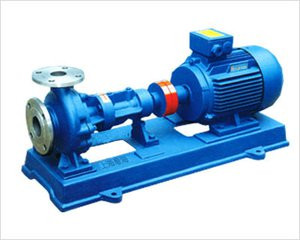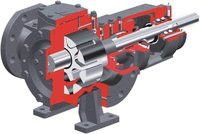Maintenance and management of high temperature gear pump

High temperature gear pump is an essential equipment for polyester melt conveying, pressurization and melt metering. High temperature gear pump than other types of melt pump compact structure, reliable operation, low energy consumption, high volume efficiency, small shear effect on the melt, stable flow at high viscosity and high pressure, no outlet pressure fluctuations. The pump has the unique advantages and key role in the process flow, so that it plays an irreplaceable role in polyester production.
Nevertheless, if the operation of the pump is not used properly, management is not in place, not only can not play its effectiveness, and even cause sudden damage to the pump.
First, the structure and working principle
A complete gear pump comprises a motor, a reducer, a coupling and a few parts of the pump head, and the pump head part consists of a pump shell, a front and rear side cover, a gear shaft, a sliding bearing and an axle seal. High temperature gear pump belongs to the positive displacement pump, which relies on the change of working volume caused by the mutual meshing of the main and driven gears to transport the melt. The working volume is composed of a pump body, a gear groove and a bearing with side plate function.
When the gear rotates, the melt enters the tooth groove of the two Gears of the suction chamber, and as the gear rotates, the melt is brought into the discharge cavity from both sides, and the gear is re-meshed, so that the melt in the groove is squeezed out of the cavity and pressed to the outlet pipe. As long as the pump shaft rotates, the gears are pressed to the outlet side to send the melt, so the pump outlet can reach a very high pressure, and the flow rate is basically independent of the discharge pressure.
Ii. Operation and Management
1, Daily Maintenance
(l) pump disintegration and cleaning, lifting, cooling, starting and stopping should be strictly in accordance with the provisions of the operation, in order to avoid undue loss.
(2) Care should be taken to maintain the stability of the population pressure of the booster pump, so that it has a stable volumetric efficiency, in order to facilitate the operation of the pump itself and the stability of downstream spinning quality.
(3) The population is negative pressure of the filler shaft seal pump, should keep the filling function pressure higher than the external atmospheric pressure. When the back pressure is reduced, the pressure of the filler letter should be adjusted in time, otherwise the pump will inhale the air, resulting in the strip breaking zone, affecting the cutting particles, resulting in the Granulator release.
(4) To constantly check the temperature of the heat medium jacket, the main body and the front and back cover of the heat medium temperature should be consistent.
(5) Each increase in production, to the time of production, speed, exit, inlet pressure, current values recorded, and the data before and after comparison, careful analysis, in order to detect anomalies as early as possible, timely processing.
2, common faults and countermeasures are as follows:
(1) Fault phenomenon: pump can not discharge
Cause of failure: A, rotation direction opposite; B, inhalation or discharge valve closed; c, inlet without material or pressure too low; d, viscosity is too high, pump can not bite
Countermeasure: A, confirm the direction of rotation; B, confirm whether the valve is closed; c, check valves and pressure gauges; d, check the viscosity of the liquid, at low speed when the proportion of the speed of traffic appears, if there is flow, the inflow is insufficient
(2) fault phenomenon: insufficient pump flow
Cause of failure: A, inhalation or discharge valve closed; b, low inlet pressure; c, outlet pipeline blockage; d, packing box leakage; e, low rotational speed
Countermeasure: A, confirm whether the valve is closed; b, check whether the valve is open; C, confirm whether the discharge is normal; d, fastening; a large number of leaks affect production, should stop operation, disassembly inspection; E, check the actual speed of the pump shaft
(3) Fault phenomenon: sound abnormality
Cause of failure: A, coupling eccentric large or poor lubrication B, motor failure; c, reducer abnormal; d, shaft seal installation is poor; E, shaft deformation or wear
Countermeasure: A, find positive or fill grease; b, check motor; c, check bearings and gears; d, check shaft seal; E, parking disintegration inspection
(4) Fault phenomenon: too large current
Cause of failure: A, high outlet pressure; b, melt adhesion through large; C, shaft seal assembly is poor; d, shaft or bearing wear; E, motor fault
Countermeasures: A, inspection of downstream equipment and pipelines; b, inspection of viscosity; c, inspection of shaft seals, appropriate adjustment; d, check after parking, whether the car is overweight; e, inspection motor
(5) Fault phenomenon: the pump suddenly stopped
Cause of failure: a, power outage; b, motor overload protection; C, coupling damage; D, export pressure is too high, interlocking reaction; E, pump bite into the abnormal; F, shaft & amp; bearing Sticky card dead
Countermeasure: A, check the power supply; b, check the motor; C, open the safety cover, car inspection; d, check the instrument interlocking system; E, after parking, positive and reverse turntable car confirmation; F, Truck Confirmation
Description: The above fault phenomenon and countermeasure is one by one corresponding relationship
Iii. measures to improve the operating life
1, because the pump body in high temperature operation, so cold installation of the pipe should be equipped with a hinge support, to prevent heating after the displacement of the pipe.
2, the coupling must be in the pump body after heating heat to find positive, in order to avoid the operation of the resulting additional torque.
3, pump outlet pressure measuring point to set up a interlocking stop alarm, otherwise, once the discharge pipeline is blocked, easy to cause damage to the pump body.
4, pump start, in the export without pressure formation, can not blindly speed up, in order to prevent premature damage to the shaft or bearing.
5, cleaning the pipetting, do not use the pump to transport cleaning liquid, should remove the inner parts, the end of the pipetting and then install, so as to avoid mixing foreign bodies in the pump.
6, pump body heat medium jacket temperature can be slightly lower than the front and rear clamp casing heat medium temperature. Because the melt viscosity and shear rate into a decreasing function relationship, gear extrusion, bearing shear will make the melt temperature through the pump after the rise of 3~5℃, reduce the heat medium temperature can prevent melt degradation. The data show that by reducing the temperature of the bearing area, the bearing capacity can be greatly increased, there is no need to replace the large capacity of the pump, only by increasing the speed can use the gear pump output capacity increased by 50%.
7, speed up to carry out slowly, do not make the front and rear pressure rise sharply, so as not to damage the bearing or make the melt clogging the lubrication channel.
8, pump outlet After the melt filter to be replaced regularly, do not long-term in the high pressure or even pressure limit operation.
9, regular replacement of bearings can save maintenance costs. When it is found that the wear on the inner surface of the shaft or bearing is close to the thickness of the hardened layer, the shaft can be polished and reused, while only the bearing can be replaced, which increases the life of the pump shaft by 8-10 years.
10, in case of power outage or heat media cycle interruption more than 30min, the pump should be disintegrated after cleaning and re-assembly, so as to avoid melt curing, cracking and so on caused by poor bearing lubrication and damage to the pump.
